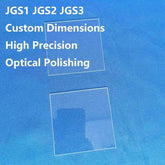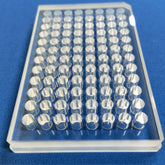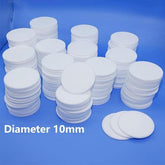Properties and applications of quartz glass
Pure quartz glass is composed of a single component, silicon dioxide (SiO2). Unlike the regular periodic arrangement of Si-O in quartz crystals, the Si-O bonds in quartz glass are arranged in a short-range ordered and long-range disordered state, so that its physical properties show isotropy. Due to the strong and stable bond energy of Si-O, quartz glass has a high softening temperature and a series of excellent properties.
Optical property
Quartz glass exhibits a range of exceptional optical properties. In comparison to ordinary glass, high-purity quartz glass demonstrates superior transmittance across an extensive spectrum from far ultraviolet (160 nm) to far infrared (5 μm). This unique capability is not commonly observed in general optical glass. The excellent spectral transmittance and optical uniformity make quartz glass widely used in semiconductor lithography and precision optical devices.

In addition, quartz glass has good irradiation resistance, and irradiation-resistant quartz glass has been widely used as window materials for spacecrafts in “Shenzhou” series and protective covers for key components of space laboratories in “Tiangong” series.
Mechanical property
Quartz glass is a kind of hard and brittle material, which is similar to ordinary glass. The density of transparent quartz glass is about 2200~2210kg/m3, and is very little affected by the temperature. The Young's modulus of transparent quartz glass at room temperature is between 7000~7400MPa, and Poisson's ratio is between 0.15~0.17.

Same as ordinary glass, the strength parameters of quartz glass are affected by many factors, including surface state, geometrical shapes, and test methods. The compressive strength of transparent quartz glass is generally 490~1960 MPa, the tensile strength is 50~70 MPa, the bending strength is 66~108 MPa, and the torsional strength is about 30 MPa. For opaque quartz glass, all its strength parameters are lower than those of transparent quartz glass. The Mohs hardness of transparent quartz glass is between 5.5 and 6.5, and the Vickers hardness is about 6963 MPa, which is higher than ordinary industrial glass.
Electrical property
Quartz glass is an excellent electrical insulating material. Compared with ordinary glass, quartz glass has a high electrical resistivity of 1.8 × 1019 Ω∙cm at room temperature. In addition, quartz glass has a high breakdown voltage (about 20 times that of ordinary glass) and a low dielectric loss. The resistivity of quartz glass decreases slightly with increasing temperature, and opaque quartz glass has a lower resistivity than transparent quartz glass.

Thermal property
Due to the strong impact of Si-O bond within the quartz glass, it has a very high softening temperature, with a long-term operating temperature of up to 1000°C. Furthermore, the thermal expansion coefficient of quartz glass is the lowest among common industrial glasses, with a coefficient of linear expansion of up to 5×10-7/°C. Specially treated quartz glass can even reach zero expansion. Quartz glass also has very good resistance to thermal vibration, that is, even if it repeatedly experiences dramatic temperature changes in a short period of time, it will not crack.

These excellent thermal properties make quartz glass irreplaceable in high temperature and extreme working environments. High-purity quartz glass can be used in chip manufacturing in the semiconductor industry, auxiliary materials for optical fiber manufacturing, observation windows in industrial high-temperature furnaces, high-power electric light sources, and as a thermal insulation layer on the surface of the space shuttle. The extremely low coefficient of thermal expansion also allows quartz glass to be used in precision instruments and lens materials for large astronomical telescopes.
Chemical property
Quartz glass has very good chemical stability. Unlike other commercial glass, quartz glass has a very high chemical stability to water, so it can be used in water distillers where there is a high requirement for the purity of water. Quartz glass has excellent acid and salt resistance, in addition to hydrofluoric acid, phosphoric acid and alkaline salt solutions, it does not react with most acid and salt solutions. Compared with acid and salt solutions, quartz glass has poor alkaline resistance and will react with alkali solutions at high temperatures.

In addition, quartz glass doesn’t react with most oxides, metals, nonmetals, and gases at normal temperatures. The extremely high purity and good chemical stability make quartz glass suitable for use in environments with high production requirements such as semiconductor manufacturing.







